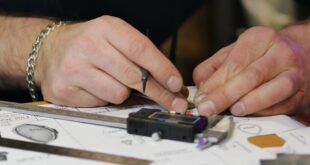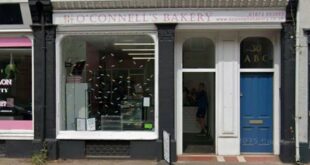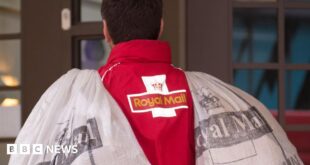You could travel cheaply by long-distance waggon as they normally carried passengers as well as goods.
The waggons were large carts covered by a canvas hood with planks or benches for passengers.
They were pulled by up to eight strong horses. Passenger fares worked out at about only a penny a mile, but the waggons normally travelled no faster than walking pace.
Advertisements show that the waggons took two days to travel between London and Basingstoke.
Stagecoaches were a much faster means of transport.
READ MORE: Flashback: Basingstoke in the year of the first Gazette
In 1713 William Nevill of the George Inn in Basingstoke announced that the “Basingstoke Stage Coach in One Day … Perform’d with Six able Horses and a good Coach” left the George every Monday and Thursday, and returned from the Bolt and Tun Inn, Fleet Street every Tuesday and Friday, “each Passenger paying, from Michaelmas to Lady-day, 9s. and from Lady-day to Michaelmas, 8s”.
However, it was only possible to make the journey in one day because the coach left the George at 4 o’clock in the morning and probably didn’t arrive at its destination until late in the evening.
The development of the staging system, meant that teams of horses were changed every 10 or 15 miles while they were still fresh, and the road improvements brought about by turnpiking and macadamization meant that coaches could travel much faster.

In 1830 the Royal Mail coach to Exeter took only five and a half hours to travel from London to the Angel at Basingstoke.
The most expensive option was to hire a post-chaise and driver from one of the larger inns.
Post-chaises were light four-wheeled coaches with a single seat for two.
Two horses generally drew them, with the post boy riding the nearside horse.
The hire of a chaise and pair usually cost 9d per mile in the 1760s, and the post boy would expect a tip at the end of each journey.
Travellers between Basingstoke and London were at risk of encountering highwaymen, particularly when crossing Hounslow Heath.
SEE ALSO: Tadley pub George and Dragon goes on market for £150k
In 1681 a newspaper reported that a highwayman stole £400 from passengers in the Exeter coach on the heath and that every coach that passed in the last ten days had been robbed.
Nearer to home, before the main road to London was diverted across Hook Common in the 1780s, it passed through Newnham.
Coaches and horses could only travel up the steep slope of Crown Lane at a walking pace.
This made it an ideal spot for highwaymen to ambush their victims.
Early in the morning of 17 October 1728 three highwaymen robbed several coaches, including the Exeter coach, coming from Basingstoke at “Newnham Hill”.
In November 1747 a “well-mounted highwayman” robbed a draper of four guineas “on the Hills between Basingstoke and Newnham”, and two highwaymen robbed a Quaker on “Newnham-Hill” in November 1750.
It is not known how many other robberies took place there that never made it into the London newspapers.
Other examples of highwaymen operating near Basingstoke included the highwayman who was known by his polite demeanour as “Civil John”.
When he robbed the Taunton stagecoach in Popham Lane in 1754 he returned the money he took from a female passenger, “she assuring him ‘twas her all”.
He also gave the coachman half a crown.

Basingstoke was once described as “A Great Throughfare”.
This was because it was situated where six major roads met: the road to London; the road to the cities of Salisbury and Exeter and the West Country; the road to Newbury and Oxford and the North, the road to Reading; the road to Portsmouth via Alton and Chichester; and the road to Winchester and Southampton.
This meant that Basingstoke was an important staging and refreshment point for travellers.
In 1782 the Feathers in Wote Street had stabling for “near 60 horses” to cater for the Exeter and Taunton coaches and the waggons that “inn at that house”.
The Maidenhead Inn supplied “neat post chaises, with able horses and careful drivers”.
When the Crown was put up for Auction in 1840, the items to be sold included 21 post horses, post chaises, flys, mourning coaches, 170 dozen bottles of port and sherry wines, the furniture of 30 rooms, 27 bedsteads, and 27 feather beds.
The Angel had stabling for 80 horses. Richard Curtis, landlord of the Angel, was said to have been worth upwards of £45,000 in 1830 and at one time kept some 500 horses in his fields for his coaching and posting businesses.
By 1830 there were 16 daily coach services from Basingstoke to London plus one three times a week, five coaches to Devonport, five to Southampton, two to Exeter, two to Salisbury and one each to Reading, Taunton and Weymouth, plus one three times a week to Bridgewater.

These stopped at Basingstoke to change horses, set down and pick up passengers and offer refreshments.
The Red Lion in London Street, the George and the Angel in the Market Place, the Feathers in Wote Street and the Crown, the Wheatsheaf and the Tuns in Winchester Street, competed for contracts to provide this service.
There were also carriers’ waggons loading and unloading goods and passengers, farm carts bringing in produce and taking goods back to the villages, post-chaises and people passing through on horseback or in their own coaches.

As well as being busy, the Top of the Town would have been noisy as well.
The sound of the coach horns warning the ostlers to get the replacement set of horses ready, the clatter of hooves on the hard ground, the rattle of the wheels and harness, the neighing of horses, the shouts of the horse handlers at the inns and the clanging of hammer against metal when the farriers had to make an urgent repair, all this continued throughout the night.
Eleven coach services arrived at their inns between ten and three every night. Such a contrast from the Top of the Town today.



